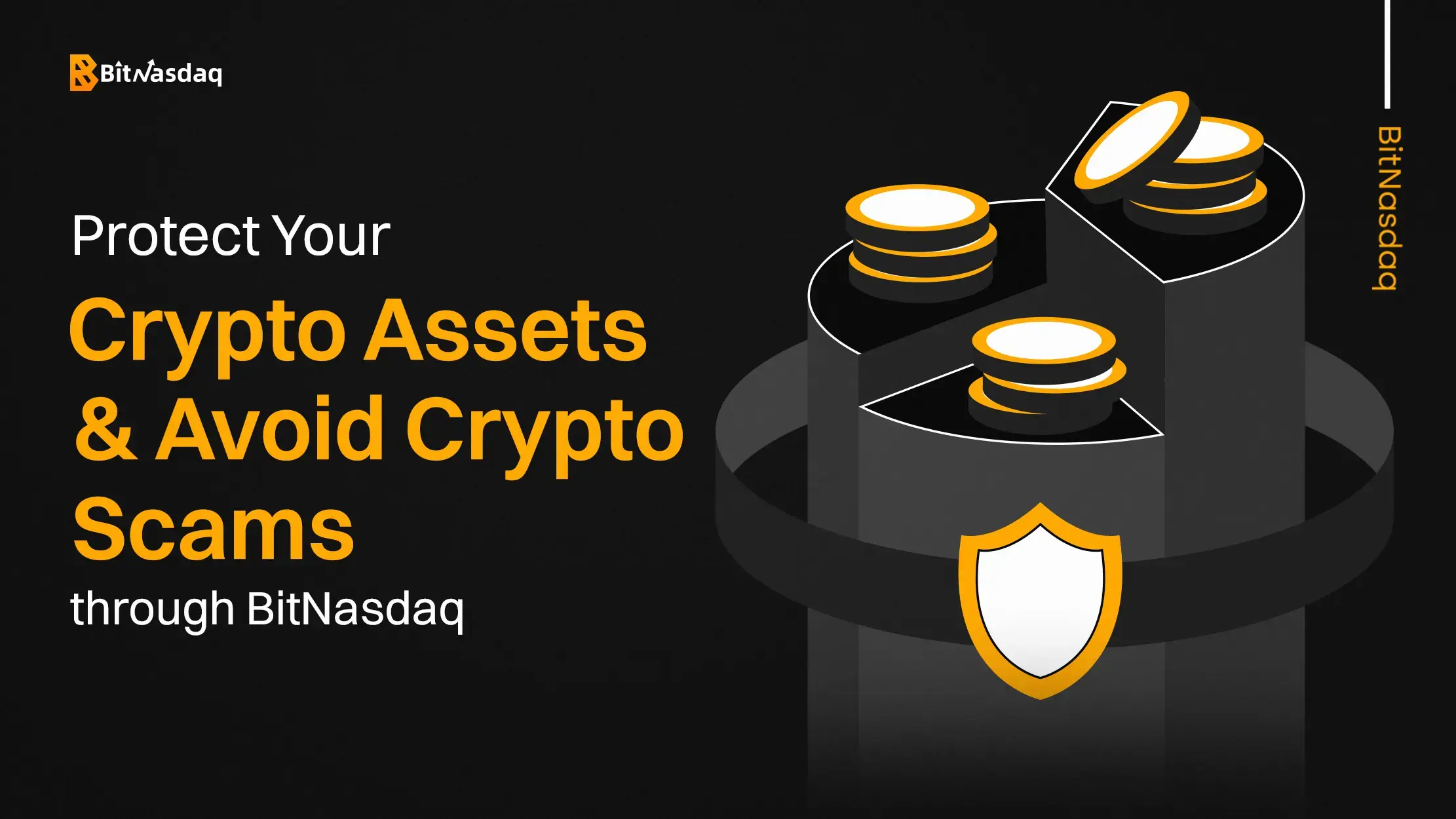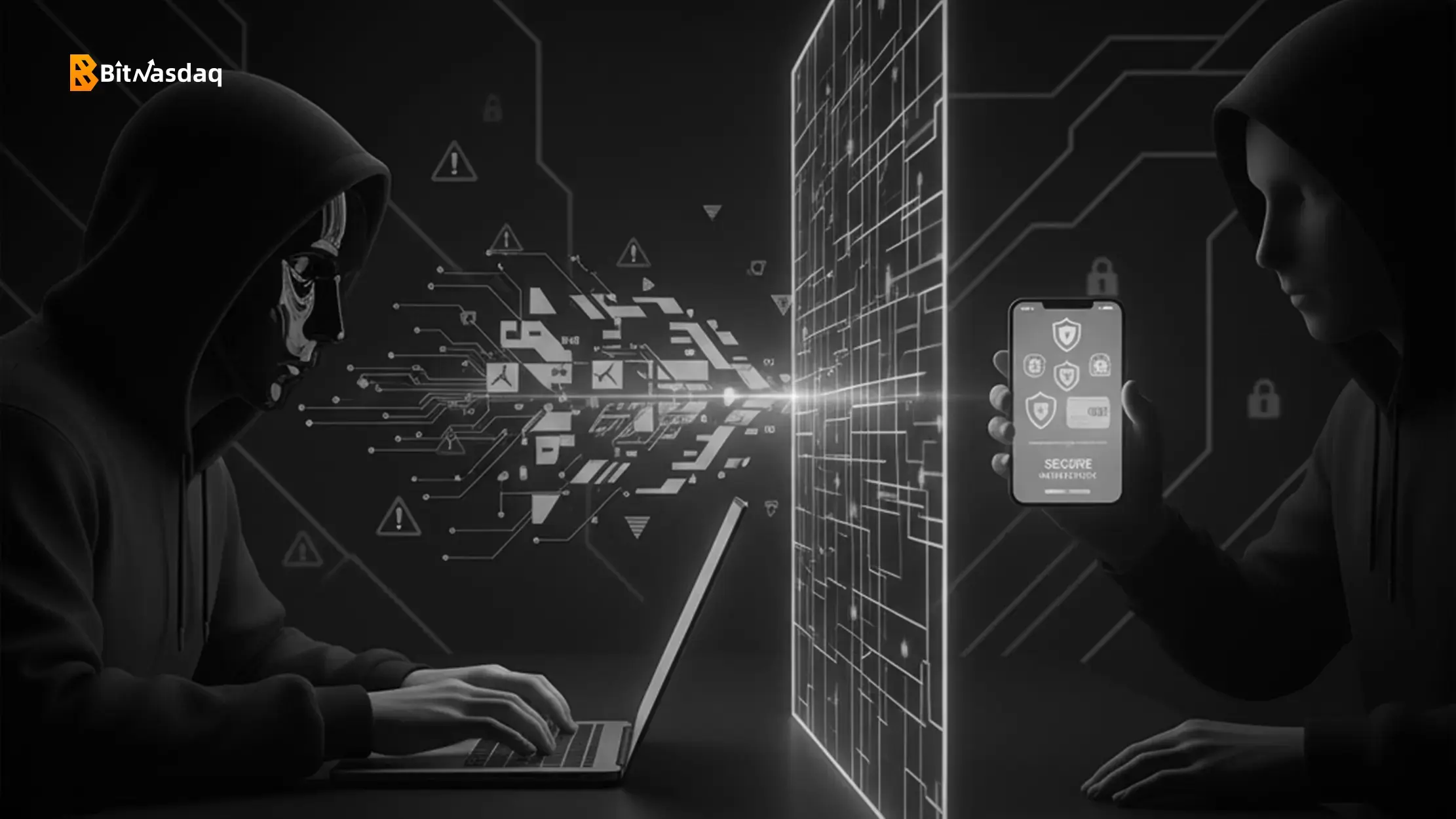Protect Your Crypto Assets and Avoid Crypto Scams through BitNasdaq
2025-10-24 12:03:33

Effectively Preventing Crypto Scams
Frequently Asked Questions (FAQs)
In the new era of technology where FinTech is revolutionizing the financial world, cryptocurrencies have been making headlines for their benefits, like encryption and transparency, but they still come with some associated risks. While a lot of people are drawn towards digital currency due to its decentralized nature, it is worth noting that such currencies are not insured by government banks, which puts the investor under a considerable risk of losing their digital assets upon a crash or a crypto scam. Just like any other place, digital currencies have also created an environment for scammers to exploit others. At BitNasdaq, the best cryptocurrency exchange platform, we will guide you through the protection of your crypto assets.
Spotting a CryptoScammer
The cryptocurrency world is growing fast, and so are the scammers. These individuals are constantly on the lookout for novices using their Ponzi schemes and phishing attacks. At BitNasdaq, your security is our highest priority. That being said, it is necessary for you to learn how to stay vigilant and spot cryptoscammers. This article will provide you with all the critical information you need to know to get started and secure your digital assets.
Here are a few most common scams to watch for!
Blackmail
Blackmail is one of the most popular methods used by cryptoscammers, in which they try to threaten digital currency owners with their sensitive information in exchange for some sort of reimbursement, usually in cryptocurrency. The blackmailer can either find some sensitive information about you or fabricate it through AI and use it to put you in a position of helplessness and send them whatever they need.
These cryptoscammers work by using leaked or stolen information about people. Therefore, it is necessary for you to be vigilant about the sites you visit and the information you give out about yourself. Protect your login credentials, and use two factor authentication on all online platforms. However, if anyone ever tries to blackmail you, report it to cybercrime or your associated cryptocurrency exchange immediately.
Fake Cryptocurrency Websites

As cryptocurrencies are increasingly becoming popular, more people are buying them. This opens up opportunities for scammers to create fake cryptocurrency websites and trick people by offering competitive prices, rewards, or low exchange fees. The buyers are deceived into thinking that they are getting a steal, which in the end turns out to be some cheap coins. Once you trade your money for a coin on these platforms, it will be virtually impossible to recover your lost funds. In order to avoid getting scammed, you need to stay vigilant and verify such websites, as they look very similar to the legitimate ones.
You can always use the BitNasdaq Media Authenticator to verify websites. This adds an additional protection layer to BitNasdaq.
Fake Giveaways
Giveaways are quite the trend on social media for product promotions. Cryptoscammers take advantage of this by offering free giveaways of digital currencies. In return, they ask for a small exchange fee, a registration fee, or personal information. The scammers might also ask you to send the fee to a particular address to receive more coins. Some scammers also ask for other cryptocurrency variants like ETH, etc. Some scammers might also ask for your private keys or personal information in the fake giveaway link. Stay vigilant because you won’t receive anything and will lose your funds forever.
Phishing Schemes
Phishing is the process of tricking people into extracting their sensitive information. Phishing emails are quite widespread. Such emails usually prompt the users to call for action or click on links that lead to resetting your password for your account, or downloading malware, ultimately compromising your personal information. Cryptoscammers can use these phishing schemes to gain access to your cryptocurrency wallet. Phishing emails can also contain links that can lead you to replica websites or cryptocurrency exchanges, and tempt you to log in from there to steal your login credentials.
These emails often are quite similar to the legitimate emails sent on behalf of the organization you are affiliated with, so it is better to double check by directly contacting the organization through their official website/email. To check the authenticity of the email, always make sure that it matches the official email address present on the organization's website.
Ponzi Schemes
Ponzi Schemes are one of the classic scams in the history of finance. These schemes are investment strategies as the scammers pay previous investors by fishing money from future depositors. Cryptoscammers advertise that these funds will be used in portfolio investment, but in actuality, they just need funds to pay back previous investors. Failure to bring in new investors leads to a loss of money for all parties.
To avoid getting trapped in Ponzi schemes of scammers, always do your research before buying cryptocurrency. Always try to buy your cryptocurrency directly from the respective currency's website and not through investors or members. If you ever find anyone trying to lure you into buying crypto with huge returns as rewards, or if the crypto value is dependent on new investors joining, know that they might trap you in a Ponzi scheme.
Pyramid Schemes

Another financial scam classic, the pyramid schemes, have also found their way in the crypto world. These schemes work by offering rewards to members or investors based on the number of people they invite to invest in. As a result, the investors proliferate rapidly. The early investors often receive high returns consistently, and they unintentionally legitimize the scheme, endorsing it. Even though legitimate organizations offer legitimate rewards upon inviting more investors, cryptoscammers find it quite easy to use these schemes and scam people, often resulting in no meaningful return.
To avoid getting scammed, always avoid investing in crypto through members/investors who offer high returns. Try not to invite your personal connections just for the sake of accumulating rewards, and if the crypto value is purely dependent on new investors joining in, there is a high possibility that it's a pyramid scheme.
Pump and Dump Schemes
The Pump and Dump Schemes are also a classic scam in the financial world. In these schemes, the cryptoscammers will promote the cryptocurrency and entice people to invest in it by telling them that its price will significantly increase in the near future. When the price gets artificially boosted due to new investments, the cryptoscammers will sell their own holdings or dump their investments for a profit, leaving the other investors with worthless cryptocurrency.
Fake Alternative Coins
Apart from the big cryptocurrency coins, some alternative coins (altcoins) also exist, which are also cheaper. Cryptoscammers can also release fake coins amongst the altcoins, deceiving people and luring them to buy these coins privately at good rates, and filling their pockets. One of the characteristic features of fake coins is their flashy websites or marketing tactics to create the fear of missing out in people. These scammers may also give out rewards or free fake coins (airdrops) in exchange for joining. Such scammers might also use the names of the big cryptocurrencies to trick people into buying them. Always do your research before selecting which coin to invest in.
Effectively Preventing Crypto Scams

Cryptocurrency involves the trading of digital assets and personal information for safe and transparent transactions. Use of both digital assets and personal information can be critical if not managed vigilantly. One mistake and you can lose everything. However, knowing how crypto scams work and staying informed can help you effectively detect and prevent Crypto Scams. BitNasdaq gives you a few tips to protect yourself and your funds because your security is our highest priority.
Keep an eye on the latest scam news
It is the utmost duty of an investor and a trader to stay up-to-date about the new and most common scams reported in the crypto market. The more you know, the less likely you will find yourself in a situation
Stay informed about new cryptocurrencies
Before entering the world of cryptocurrency, do your research and learn about the different currencies trading. After buying your currencies, keep in touch with your research about new currencies and their legitimacy
Avoid free launches or pyramid schemes
Always be skeptical before investing in new currencies. Avoid free launches that offer free coins/rewards for just joining in, or pyramid schemes that guarantee high returns.
Always protect your keys in reputable wallets
Your cryptocurrency can only be accessed through a private key, which is a password accessible only to you. Always opt for a reputable wallet with robust security that no one else can access.
Always Use Two-Factor Authentication
Always use strong passwords and two-factor authentication to avoid getting hacked. Do not share any information that can help anyone access your private keys with anyone.
Be Skeptical about charities and donations
Charity organizations rarely ask for funds in crypto. If they do so, always verify the websites through BitNasdaq's Media Authenticator
Protect yourself against malware attacks
Never open any suspicious links sent to you on social media platforms or emails without verifying the source. Install an antivirus program and never open attachments that end with .exe, .vbs, or .scr. Always report it to cybercrime or your associated cryptocurrency exchange.
Be Skeptical about money transfer requests
Do not agree to any money transfer requests from strangers through any emails or any sort of inbound communications asking for help moving funds.
Verify Giveaways
Never participate in giveaways on random social media platforms. Always double check and verify the source. Never enter your personal information, like name, contact details, address, account details, etc., in giveaway links, as they could be scams to trick people into giving out their sensitive information
Reporting a Crypto Scam

Online transactions, either crypto or not, are inherently risky. Scammers often take advantage of this vulnerability, which is why it is necessary that everyone should be aware of how to report a scam. If you own digital assets or invest in cryptocurrencies, you need to take precautionary measures to detect and prevent getting scammed. However, if you ever get trapped in such scams, or suspect one, or even notice scammers deceiving people around you, you can always report to cybercrime or your associated cryptocurrency exchange.
How BitNasdaq Protects You
Security Measures
BitNasdaq implements strict security measures to protect your funds and sensitive information through KYC verification, Two-Factor Authentication (2FA), and advanced data encryption. All transactions are carried out exclusively through the BitNasdaq app and never privately or through any third parties.
Media Authentication Service
Additionally, BitNasdaq also provides media authentication services where you can verify any website, link, email address, contact number, social media platform, or any other source through the BitNasdaq Media Authentication Page to confirm if the sources are officially affiliated with BitNasdaq.
BNQ Purchase
You can only purchase the BNQ Tokens on the official BitNasdaq app and Official website. Do not trust any third-party platforms, websites, or individuals claiming to sell BNQ Tokens. All official transactions are strictly conducted on BitNasdaq.
BNQ Mining
The BNQ Mining feature is exclusive to BitNasdaq. You can only mine BNQ Tokens through the official BitNasdaq app, including mining machine purchases and Hashrate purchases. No third-party seller is authorized to sell BNQ Mining services or Mining Machines.
P2P Trading
For P2P trading, BitNasdaq encourages you to always double-check and confirm the receipt of payment before transferring your digital assets. Never accept payments from third-party individuals. Verify the payer/payee's name matches the counterparty’s verified name on BitNasdaq.
To access our Official Telegram Channels
Only trust information and updates from our official Telegram Channels, which include:
Access to Official Social Media Channels
Only trust information and updates from our official social media channels:
Any other pages, groups, or channels outside of this list are not affiliated with BitNasdaq and should be treated as unverified. Your security is our priority.
Frequently Asked Questions (FAQs)
Some companies offer great rewards for small investments. Is it safe?
Some classic cryptoscammers will try to entice you to invest in crypto by saying that it will make you significantly rich with minimal investments in a short span of time. In crypto, it often takes quite a while before you can harvest your fruits. Money doubling schemes are mostly fraudulent.
Is copy and paste malware a real threat?
Yes, cryptoscammers can use copy and paste malware to get access to the Bitcoin or cryptocurrency address that you copy and paste on your clipboard. The copy and paste malware is a very sneaky kind of malware, but it only works if you click on a suspicious link that installs this malware into your computer. Always be careful with what kind of links and websites you open.
How can I avoid malware threats?
You can consider installing a trusted and verified antivirus software that scans for malware threats regularly. Never fall for unverified giveaway links or phishing emails.
Are cryptocurrency donations possible?
Yes, it is possible to donate your cryptocurrency assets to individuals and organizations online, given that they accept such donations. However, verify the organization before donating, as it could be a fraud scheme as well.
Is my information safe with BitNasdaq?
BitNasdaq implements strict security measures to protect your funds and sensitive information through KYC verification, Two-Factor Authentication (2FA), and advanced data encryption. Click Hereto learn more about Two-factor Authentication.
How do I report a scam?
If you ever get trapped in such scams, or suspect one, or even notice scammers deceiving people around you, you can always report to cybercrime or your associated cryptocurrency exchange.
 Share
Share
 Like
Like
 Dislike
Dislike

